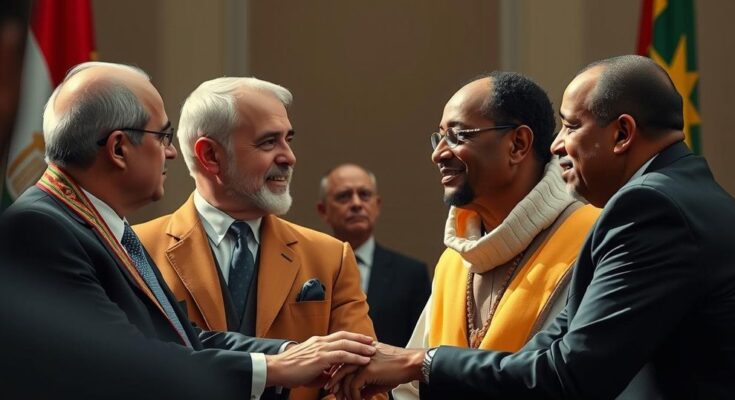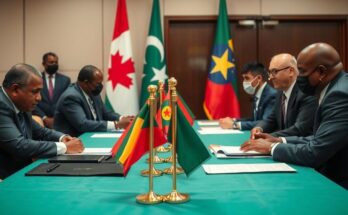Ethiopia seeks to replace Somalia’s Foreign Minister Ahmed Fiqi despite Egyptian opposition, complicating Somalia’s diplomatic ties. President Hassan Sheikh Mohamud’s visit to Ethiopia established renewed relations, although Fiqi remains in Egypt discussing a trilateral alliance. This tension reflects broader geopolitical rivalries involving Ethiopia, Egypt, and regional Somali states, influencing Somalia’s foreign policy direction and internal stability.
In a significant geopolitical development, Ethiopia is reportedly pushing for the replacement of Somalia’s Foreign Minister Ahmed Fiqi, facing opposition from Egypt which complicates Somalia’s diplomatic strategies. This situation unfolds as Somali President Hassan Sheikh Mohamud visits Ethiopia, achieving a diplomatic milestone with the formal restoration of ties between the countries. Notably, Foreign Minister Fiqi is absent from this visit, engaged in discussions in Egypt aiming to strengthen a trilateral alliance involving Somalia, Egypt, and Eritrea, perceived as a counterbalance to Ethiopia’s influence.
Concerns arise regarding President Hassan Sheikh’s approach to Ethiopia, as it potentially undermines relations with Somali federal member states, particularly Puntland and Jubaland, which have historically maintained strong ties with Ethiopia. These regions are significant to Ethiopia’s strategic security interests, especially regarding militant threats. Ethiopia’s role in Somalia’s security has been critical, including the recent agreement to include its troops in the revamped African Union peacekeeping mission, further complicating dynamics within the region.
Additionally, Egypt’s resistance to Fiqi’s replacement highlights the broader power struggles within the Horn of Africa, as Cairo bolsters its connections with Somalia and Eritrea through a counteractive alliance to dilute Ethiopia’s rising power. Previous tensions over Somali officials’ political alignments have raised questions about the future of Ahmed Fiqi, reminiscent of the previously dismissed intelligence chief Mahad Salad, who was removed for his alignment with Egyptian interests.
Criticism has mounted against President Hassan Sheikh’s foreign policy, which some analysts claim is erratic and influenced by personal rather than national interests. This inconsistency exposes Somalia to external manipulations and threatens its national integrity, particularly in the context of Ethiopia and Egypt’s fierce competition for influence within Somalia. As the political landscape remains unstable, it mirrors the broader geopolitical rivalries that characterize the Horn of Africa.
The Horn of Africa is a region marked by intense geopolitical tensions, especially among Ethiopia, Somalia, and Egypt. With Ethiopia advocating for the replacement of Somali officials deemed aligned with its interests, and Egypt positioning itself to counterbalance Ethiopia’s increasing influence, the dynamics become intricate. The historical relationships between federal member states in Somalia and Ethiopia further complicate these political maneuvers. In recent years, diplomatic ties have oscillated based on shifting alliances and external pressures, reflecting the multifaceted nature of international interactions within this region.
The ongoing tensions surrounding the potential replacement of Foreign Minister Ahmed Fiqi amidst President Hassan Sheikh’s diplomatic efforts underscore the complexities of international relations in the Horn of Africa. Both Ethiopia and Egypt are vying for influence over Somalia, with consequences for the country’s sovereignty and regional stability. The current geopolitical landscape necessitates strategic foresight and coherent policies to safeguard Somalia’s national interests against external pressures and historical rivalries.
Original Source: www.garoweonline.com




